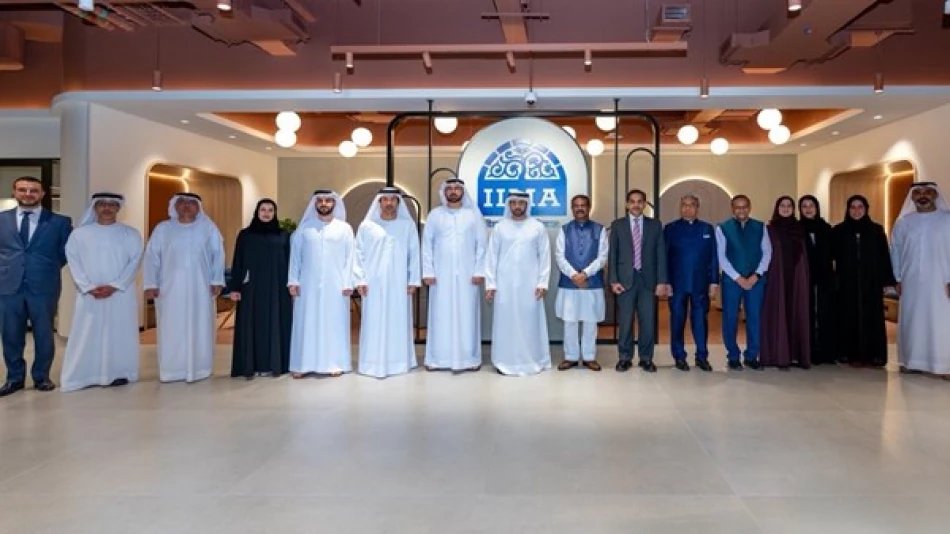
Dubai Crown Prince Inaugurates First Global Branch of Indian Institute of Management in Ahmedabad
Dubai Lands Prestigious Indian Management Institute as City Accelerates Knowledge Economy Push
Dubai has opened the first international branch of the Indian Institute of Management Ahmedabad (IIMA), one of Asia's most prestigious business schools, marking a strategic win in the emirate's ambitious plan to become a global knowledge and innovation hub. The move signals Dubai's intensifying competition with Singapore and other regional centers to attract top-tier educational institutions and talent.
A Strategic Educational Investment
Sheikh Hamdan bin Mohammed bin Rashid Al Maktoum, Crown Prince of Dubai and Chairman of the Executive Council, inaugurated the IIMA campus in Dubai Academic City. In a social media announcement, he emphasized that this development aligns with Dubai's Economic Agenda D33 and the Education Strategy 2033, both designed to enhance the city's global competitiveness.
The timing is significant. As Dubai positions itself as a post-oil economy leader, attracting world-class educational institutions becomes crucial for developing local talent and drawing international students who may eventually contribute to the workforce.
Why IIMA Matters for Dubai's Ambitions
Academic Prestige and Regional Influence
IIMA consistently ranks among the world's top business schools, often compared to Harvard Business School and Wharton. Established in 1961, it has produced numerous CEOs of major corporations and government leaders across South Asia. By securing IIMA's first international branch, Dubai gains access to this prestigious network and educational expertise.
Targeting the Indian Diaspora
Indians constitute the largest expatriate community in the UAE, representing roughly 30% of the population. An IIMA campus in Dubai offers a compelling proposition for Indian families seeking quality education without the complexities of studying in India's highly competitive domestic market. This could strengthen Dubai's appeal as a long-term residence destination for high-skilled Indian professionals.
Regional Competition Intensifies
Dubai's move mirrors strategies employed by Singapore, which has successfully attracted branches of prestigious institutions like INSEAD, MIT, and various Ivy League schools. Singapore's education hub model has generated significant economic returns through student spending, research partnerships, and talent retention.
The UAE faces growing competition from Saudi Arabia's NEOM project and Qatar's Education City, both aiming to establish knowledge-based economies. By securing IIMA, Dubai demonstrates its continued ability to attract premier institutions despite regional rivalry.
Economic and Market Implications
Talent Pipeline Development
For businesses operating in Dubai's financial and technology sectors, the IIMA branch represents a potential source of high-caliber management talent. This could reduce recruitment costs and improve the quality of local leadership, particularly beneficial for companies expanding across Middle Eastern and South Asian markets.
Real Estate and Infrastructure Impact
Dubai Academic City, already home to numerous international university branches, will likely see increased demand for student housing and commercial services. The presence of IIMA students and faculty could drive premium residential and retail development in the area.
Long-term Strategic Value
This development represents more than educational expansion—it's part of Dubai's systematic effort to reduce economic dependence on traditional sectors. By 2033, Dubai aims to double its economy size, with knowledge-intensive industries playing a central role.
The IIMA partnership also strengthens UAE-India economic ties at a crucial time, as both countries deepen trade relationships and India emerges as a major global economy. Educational collaboration often precedes expanded business partnerships, potentially benefiting Dubai's position as a gateway between East and West.
Success will ultimately depend on IIMA Dubai's ability to maintain the academic standards and industry connections that make its Ahmedabad campus valuable, while adapting to the unique opportunities and challenges of the Middle Eastern market.
Most Viewed News

 Layla Al Mansoori
Layla Al Mansoori






